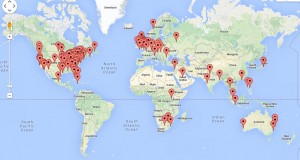new posts in all blogs
Viewing: Blog Posts Tagged with: google analytics, Most Recent at Top [Help]
Results 1 - 8 of 8
How to use this Page
You are viewing the most recent posts tagged with the words: google analytics in the JacketFlap blog reader. What is a tag? Think of a tag as a keyword or category label. Tags can both help you find posts on JacketFlap.com as well as provide an easy way for you to "remember" and classify posts for later recall. Try adding a tag yourself by clicking "Add a tag" below a post's header. Scroll down through the list of Recent Posts in the left column and click on a post title that sounds interesting. You can view all posts from a specific blog by clicking the Blog name in the right column, or you can click a 'More Posts from this Blog' link in any individual post.

By: Hannah Paget,
on 5/9/2015
Blog:
OUPblog
(
Login to Add to MyJacketFlap)
JacketFlap tags:
Arts & Humanities,
Byron's Letters and Journals,
Richard Lansdown,
Books,
Literature,
google,
google analytics,
jane austen,
Darwin,
Byron,
henry james,
Shelley,
keats,
george eliot,
Foucault,
literary figures,
*Featured,
Derrida,
Add a tag
Where would old literature professors be without energetic postgraduates? A recent human acquisition, working on the literary sociology of pulp science fiction, has introduced me to the intellectual equivalent of catnip: Google Ngrams. Anyone reading this blog must be tech-savvy by definition; you probably contrive Ngrams over your muesli. But for a woefully challenged person like myself they are the easiest way to waste an entire morning since God invented snooker.
The post Literary fates (according to Google) appeared first on OUPblog.
You’re sitting at your laptop, typing away. You know content is the absolute King of the internet jungle. And, you know inbound marketing is the best way to bring traffic to your website.
But, which of your content efforts are producing the most benefit. In other words, what post or website page or other strategy, or what combination of efforts are the ‘conversion powerhouses?’
You scratch
This month-long series of blog posts will explain author websites and offer tips and writing strategies for an effective author website. It alternates between a day of technical information and a day of writing content. By the end of the month, you should have a basic author website up and functioning. The Table of Contents lists the topics, but individual posts will not go live until the date listed. The Author Website Resource Page offers links to tools, services, software and more.
Track the Growth of Your Author Website

You’ve gone to a lot of trouble to set up a website. Don’t you want to know how many visitors the site gets? You can find out this and much more by the use of a statistics and analytical package. And fortunately, WordPress makes this easy with a couple plugins.
Statcounter. Statcounter is a simple, easy to understand statistics and analytics package that records information in real time. You don’t have to wait until tomorrow to see what traffic is like today. I like this one because of its simplicity. First search Plugins/AddNew/Statcounter. Install and activate the plugin. Go to Statcounter.com and set up an account. Follow their instructions for configuring the plugin with your account information. Sit back and watch the numbers roll in!
Besides general numbers, I especially like to look at the Visitor Paths.This tells me what websites a visitor sees in what order. And I love to look at the Recent Visitor Map, which shows the location of your visitors. Or, look at Country/State/City/ISP. Today (the day I wrote this post) 62.5% of my visitors were from the US, and people from 35 different countries visited this site. Notice that there are NO personally identifiable bits of information here, so the Privacy Policy is still accurate.
Note that I have a free account, which means: Each projects comes with lifetime summary stats as well as a free log size of 500, i.e. a detailed analysis of the last 500 pageloads on your website. When your log is full, it continues to operate; the oldest entry is replaced with the newest entry that comes in. So, that number (62.5% of recent visitors are from the US) only refers to the last 500 visitors to my site. Statcounter is real time and as the globe turns, you can see the progress of daylight across the globe by looking at your visitors locations! Cool, huh?a

Location of visitors to Fiction Notes. Click to enlarge.
Google Analytics. Another common option for website statistics is Google Analytics, and it’s a free powerhouse. You should set this up, but it might take a year or two to learn the ins and outs; in fact, I’m still learning. Yes, of course, there are WordPress Plugins for this. Search Plugins/AddNew/Google Analytics to find a couple dozen plugins. Some will only add in the required code, but some add bells and whistles. Try out a couple until you find something you’re comfortable with. Sign up with Google Analytics and follow their directions and tutorials to get everything set up.
Do you need both stat programs? Here’s the dirty little secret about stat programs: they never agree. Your CPanel may be set up with server stats, which will differ from both of these programs. Generally, they will be close, but there are all sorts of reasons why they may not agree. When I set up my account seven years ago, Statcounter was the only program that recorded information in real time; Google Analytics only added that feature recently. I could probably go with just Google Analytics, but it’s so complicated–complete and wonderful, but complicated–that I still stick with Statcounter for simplicity. When I really need to dig into stats, though, to figure out something about my traffic, I rely on Google Analytics. For me, it’s a win-win to use both. But you don’t have to! There are many other stat programs, too, so find what works best for your website and your needs.
The best thing about stats? You can track the growth of your website from just a few visitors the first month to that first exciting day of 100 visitors and onward and upward to 1000 a day or more.

Today I have a great two-part marketing guest post by freelance writer Clare Evans.
Monitoring Marketing Success - 5 Things to Track on Google Analytics
By Clare Evans
You invest a great deal of time and money into online marketing. Everything from your Pay-Per-Click (PPC) advertising to your search engine optimization (SEO) efforts can cost you both time and money. So you want to know that your hard work is paying off.
Google Analytics (http://www.google.com/analytics/) is perhaps the most popular way to track your online success. With a comprehensive, user-friendly interface; the software certainly has that ‘all under one roof’ feel.
Whether you’ve had your website 5 minutes or 5 years, setting up an analytics account is the best way to monitor your marketing success. Tracking your conversions, visitors, and much more has never been easier or more important. Here are five things you should be tracking on Google Analytics:
1. Customer EngagementEngaging with your customers is an essential part of your marketing strategy. Tracking this is made easy with the comprehensive features on Google Analytics. GA will track everything from your bounce rate and time on site statistics, through to comparing your site visits to the number of unique visitors.
This is important because you need to know how well your site is performing. If your bounce rate is above 50%, and your average pages visited is low, you know there’s something not quite right with your landing pages. It’s also useful to know how many returning visitors your site has, compared to the number of unique visits.
Armed with all this information, you can tailor your marketing efforts accordingly. For instance, you can work to get people to stay on your site longer, or give them an incentive to return. This means you can rework your SEO, PPC, and other marketing campaigns efficiently.
2. GoalsIf you’re using GA to monitor your marketing, you should be setting up custom goals. What do you want to achieve with your website? Are you looking for people to visit a certain page? Stay on the site for a certain length of time? Sign up to your newsletter?
Whatever your goal, set up GA to monitor and track your success. For instance, say you want to see how many people have downloaded your eBook. Set up your goal to monitor the number of people that reach the ‘thank you’ page after downloading. Only these visitors will be able to access this page, so you’ll be able to track downloads.
This is the same for enquiry forms and newsletter sign ups. Once you know how successful your current site is, you can make the appropriate changes to improve your goals. You should always aim to improve both the user-experience and success of your website.
Stop by next Wednesday, August 8th, for Part Two of this article. It will have tips three to five, plus a bonus tip - you won't want to miss it. This guest post has been supplied by http://birdandcocreative.co.uk.
The UK based graphic design agency can help you boost your online marking efforts with a new website, and some SEO tips.~~~~~~~~~~
Great Marketing Tool
Turn Words into Traffic with experienced marketer Jim Edwards. Jim will show you his quick and easy techniques for pumping out high-quality, persuasive, and professional articles, along with getting great guest blogging spots. He even goes into PLRs, articles written by someone else that you can claim as your own.
Check it out for yourself by clicking on the
LINK.
~~~~~~~~~~
More Marketing Articles
Headlines That Increase Website Traffic and Website Conversion RatesUsing Video for MarketingBeyond Book Sales Income: Book Marketing and Diversification~~~~~~~~~~
To keep up with writing and marketing information, along with Free webinars - signup for The Writing World newsletter on the right top sidebar!Until next time,
Karen Cioffi
Multi-award Winning Author, Freelance/Ghostwriter, Editor, Marketer
Writer’s Digest Website of the Week, June 25, 2012
“This site from Karen Cioffi should stand as a model for other freelance writers.”
~ Brian A. Klems, Online Editor for Writer’s Digest

If you've ever searched your site on Google and then sat in wonder trying to figure out what page it was on, take heart. Many site owners are wondering the same thing. Search results ping back hundreds of sites, but when you find yours showing up on page five--or worse--page fifty, you know it's time to take action. Studies have shown that 93% of web users don't look past the first page of results. So what's a website owner to do? Well, there are a few things that are out of your control: algorithms for one and competing sites for another. But you can make sure your site is armed for effective ranking and high searchability. Here's how.
1. Make sure you have an analytics system and know how to use it: first and foremost you want to make sure that you have access to your back end statistics. Why? Because they're important and because you want to know how much traffic your site is getting and where it is coming from. Also, learn how to read these reports. I would recommend considering Google analytics, it's the easiest to learn, manage, and install. [Editor's note: check out Anne-Marie Nichols's article on WOW! for step-by-step instructions on using Google Analytics: Blog Analytics 101: How to Use Google Analytics Effectively.] You'll want to monitor this data a few times a month (especially if you're knee-deep in book promotion) to see where your traffic is coming from and whether the work you are doing to send people to your site is paying off in unique visitors.
2. What is the one major goal for the site? Do you know what you want your site to do? If you don't, then start here and make this your #1 priority. You must have one major goal for the site (yes, you can have additional goals for it but you need to identify your #1 priority first). If your goal is to sell books then you need to be clear about this message. Why is Google going to care about this? Because part of the reason some sites don't get consistent good traffic or ranking is that their site is a mish-mash of 9 different major goals and confusing messages. If your site visitor is confused, Google will be too.
3. Keywords: I know this is a tricky area. The term "keywords" often conjures up the idea that hours of research are involved in getting the perfect set of words. Well, it make take you a few hours but it's worth it. You want to know this not only to identify what your users are searching on but also, what words Google will rank you best for. Identify first where your major searches are coming from via your back-end site statistics, then head on over to the Google AdWords Keyword Tool and see what's coming up in your market search-wise. Once you have these keywords you'll want to use them on your site. See #4.
4. Use of keywords: there is a good way to use keywords and a bad way. The good way is to use them in sentences, headers, blog posts, articles, Twitter postings. The bad way is to do keyword stuffing, which is where you stuff a blog post or intro paragraph on your site with so many keywords that not only does that paragraph not make sense, the keywords won't even get ranked in Google because there are so many of them used in a non-sensicle way. I'm not kidding. Google can spot keyword stuffers a mile away. Here's a tip if you're using keywords in a blog post--use them in your header, first paragraph an
You might already be enjoying the information gathering capabilities of Google Analytics, but if you’re not, let me give you a heads up.
Google Analytics (from this point on to be referred to as GA), like many other site tracking programs, allows you to track visitors to your website. The free service also tracks where your visitors come from, how they arrived (referral or direct), and what keywords they may have used to visit your site. You can compare data and track trends as well as integrate Analytics with any AdWords you may have purchased from Google to see how they drive traffic to your site.
You can also waste a lot of time playing with the map function and figuring out where your readers come from. I, for example, have a group of lovely readers from Australia who visit the site regularly (It takes all my willpower to refrain from a wince-worthy “G’day” at this moment), the number of which remained unknown to me until I installed GA on my site.
I know I sound like a commercial, but I’ve had GA on Bookseller Chick for several weeks now and the data I’ve collected is very interesting. The free Bravenet counter you can see at the bottom of the links in the right hand column is something I’ve had since a few months after I started Bookseller Chick, and it only tells me the last ten people to visit, providing very little information beyond that point. GA allows me to see what keywords people have used to visit, how many people are return visitors and how long visitors stay on my site. Andrew Beierle’s guest column has a number of incoming links that continues to bring in traffic and I’ve received many visitors using the keywords “Stephanie Gayle” and “My Summer of Southern Discomfort” (more so than people searching for the keywords “Bookseller Chick”). I can even track how many people have linked to “Online Publicity Kits: Do You Have One?” or have stopped by to visit it. (By the way, if you’re one of those people and you haven’t gone back and read La Gringa’s additional recommendations in the comments, then you should.)
What does this tell me? It lets me know where you are coming from and why. It makes me think that maybe I should invite Stephanie and Andrew back for another round of guest blogging as they seem to be popular.
Finally I can judge interest in different topics without relying on whether or not people comment or ask questions (although please don’t see that as a reason to not comment or ask questions because a girl could always use a little more guidance).
Over the next few weeks I want to focus on ways that you as an established author (or one who has yet to be published) can drive traffic to your site and increase your authority in the eyes of the Google algorithm. Google Analytics and other information gathering programs can help you track this information and see if it is actually affecting your audience’s size.
If you have an alternate program that you like better than GA that is also cost effective (free is very, very nice), let me know and I’ll add the link here along with a description of how to install and what it does. With GA all I had to have was a gmail account and know how to drop a line of code into the Blogger template.
As a promoter of your books, it is important to know what your audience is interested in. Do they keep coming to your site looking for a family tree of your characters that you don’t have? Maybe you should build one. Did you see an increase in traffic due to an interview at website X? Maybe you should make a note to visit them again when the next book is ready to drop.
Knowing your audience allows you to focus your book advertising and marketing that much more. Using an information tracking program like GA allows you to decode the mystery of that process.
So... last night was the first of two performances of our children's Summer Theater camp, and I was there early and home late. That meant skipping dinner. So I guess I went to bed a bit hungry. And I dreamed about a kitten eating spaghetti of all things. I guess since we had been playing a game with the children before their performance... a game involving FOOD names, I must have had food on my mind. And this is what happened in this morning's sketching session.

©GingerNielson
And now I'm hungry all over again!

You can watch a documentary clip of spaghetti being harvested
here.









Great post! Hi from Boson :)
I've been a statcounter fan, but GA sounds more fun...
Thanks for that. I've also used and liked StatCounter. Having moved onto Word Press with my latest blog I'm liking the plugins that are available - nice how the get built into the blog's dashboard.
I use GA on my blog. It's very helpful to see what drives traffic to the blog.
Oh, and thanks for making me feel popular!
I've recently discovered GA as well, and like it a lot (although haven't explored too much). Sitemeter is another good free one that shows almost all (or maybe all) of the same info as GA--many of the bloggers I know have been using that for a while (you can see it on the bottom of both mine and the Blue Rose Girls blog).
I love GA. It's an eye-opener. I've stopped banner ads (they can really ad up) mostly because GA showed me they were sending me NO traffic at all. You'll see some surprises, as you point out. I look forward to your forthcoming tips, because I know I could be doing more with keywords, etc.
I've had StatCounter for well over a year and have really liked it. It's also free or you can upgrade to a paid subscription.
Thanks for the heads up on GA. I'll have to take a look at it.
I like GA, but I don't mess with it too much these days.
Thanks for the shout out! And thanks for pointing me to Google Analytics -m I am officially obsessed now. Another good site counter for real time stats is sitemeter and it is free. :-)
If you ever want me to answer some qustions for your readers on the marketing or publicity of books, lemme know. Always happy to help new writers find readers. :-)